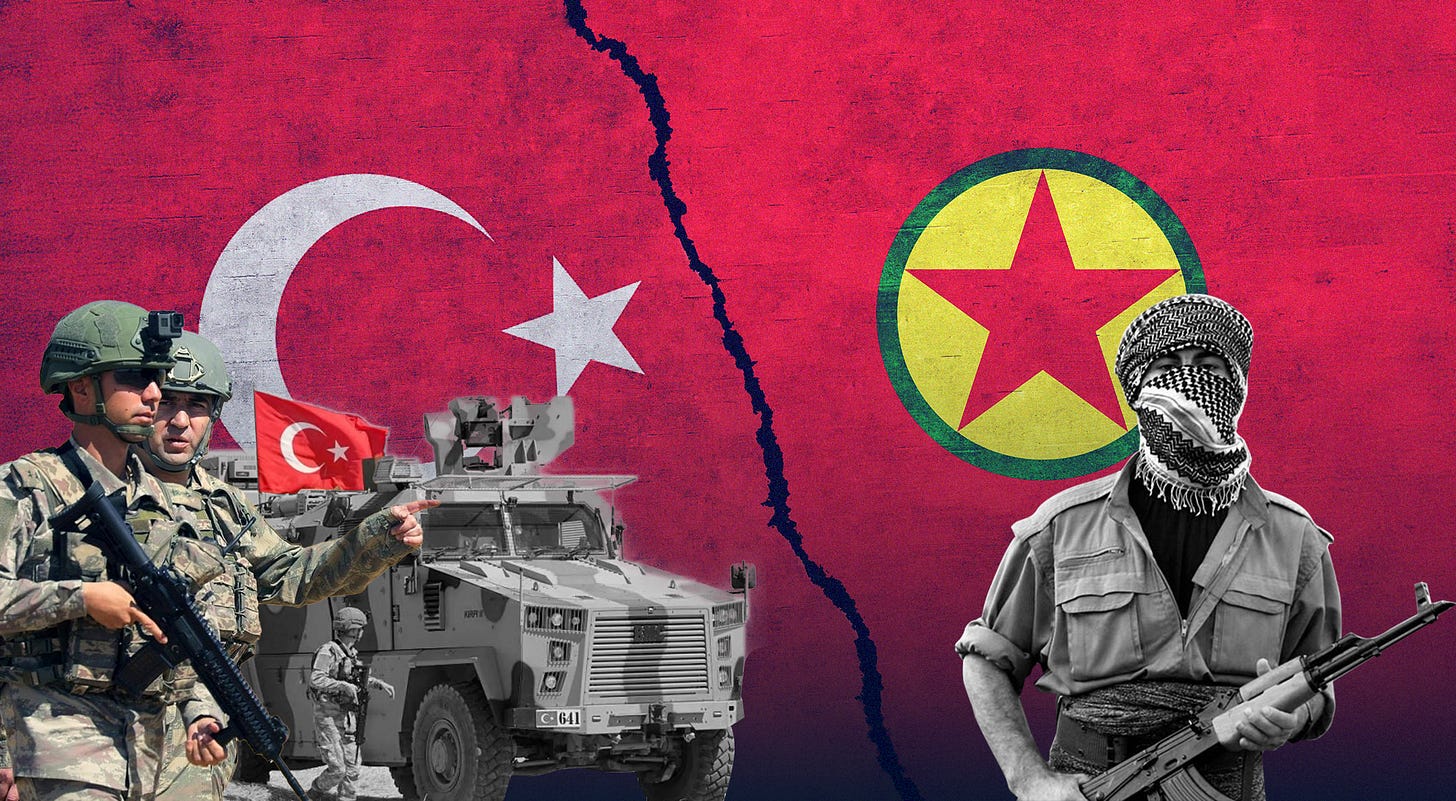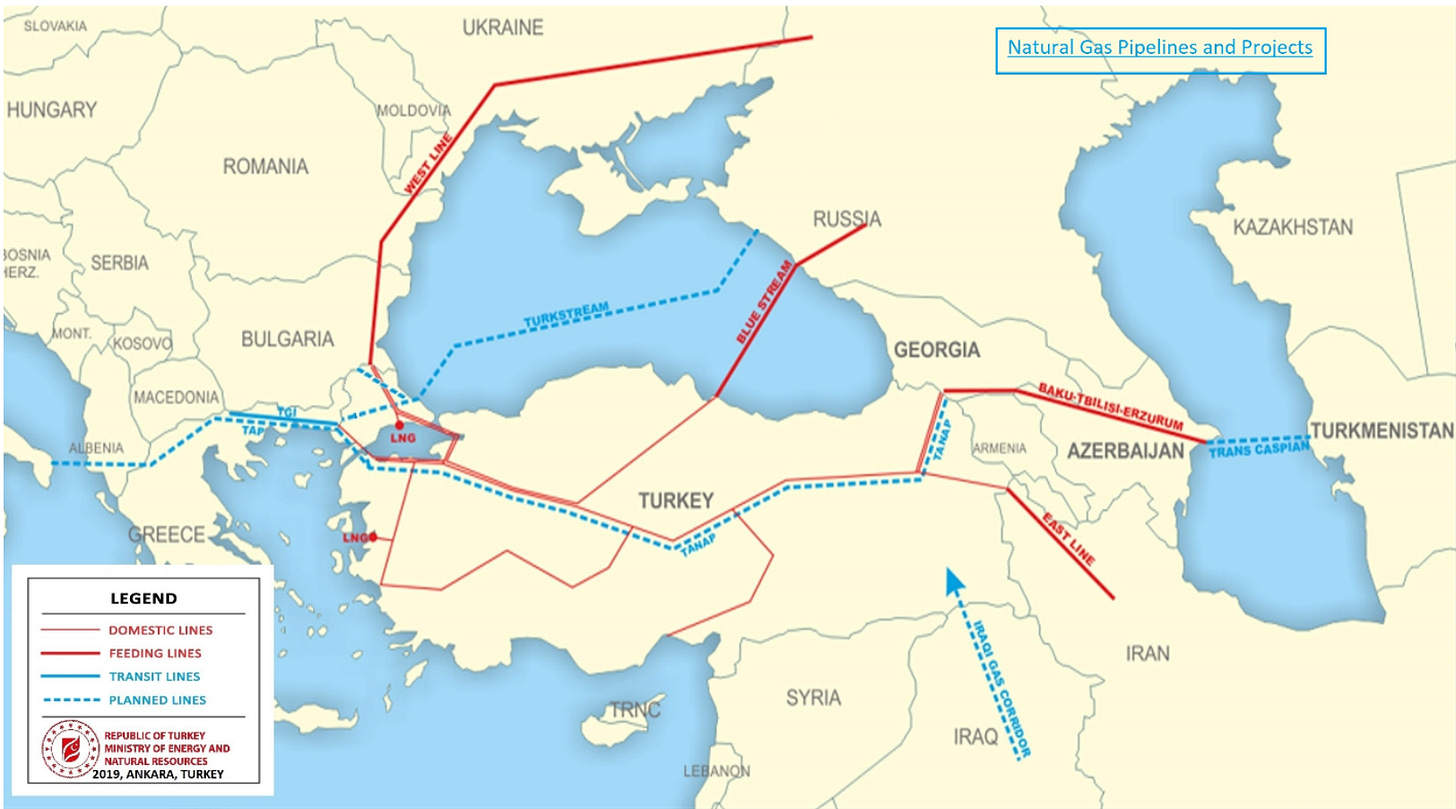Turkish Delight: How Turkey became the new regional power player
📡 Napoleon once famously said ‘If you want to understand the behaviour of a country, just look at a map’. If the 2020s have proven anything, it’s that global politics keep getting messier. And if there's one thing Turkey has figured out better than most, it's this: If you’re not at the table, you’re on the menu.
Given everything that’s been happening on the world stage these past few weeks, It’s hard to pick clear winners or losers (then again, why would you?). But one leader who’s pretty happy about how things are going is Recep Tayyip Erdogan.
But first, a bit of background as to what’s been going on.
🇹🇷 Power, Politics & The 2028 Question
📌 Note: I wrote this introduction two days ago, and yet, Turkey’s political drama never fails to amaze. Just today, Istanbul Mayor Ekrem İmamoğlu—the man widely seen as Erdoğan’s biggest challenger in 2028—had his university diploma revoked and was slapped with corruption and criminal charges.
The move effectively disqualifies him from running for president since Turkish law requires candidates to hold a university degree. Just days before his expected nomination as the opposition’s main contender, he’s suddenly out of the race.
And if you’re now wondering why Erdoğan decided to take out his most prominent political opponent, the short answer is: Because he can. ‘And when you can, you do.’ (Forgive the lame Peaky Blinders analogy.) Back to the subject.
Recep Tayyip Erdoğan has been in power for over two decades, and his term is set to end in 2028. The problem? He wants to stay.
That hasn’t stopped Erdoğan before. If he wants to stay in power, he’d have to change the rules—yet again. But there are only two ways to do it:
Amend the constitution to remove term limits.
Call early elections, which would reset the term count and allow him to run again.
But here’s the catch: Erdoğan doesn’t have enough votes in parliament to push through a constitutional change or trigger snap elections. His ruling AKP party relies on support from the far-right MHP party, but even together, they fall short of a majority.
So what’s his play? The Kurds.
🇹🇯 The Kurdish Factor: A Surprise Peace Deal?
For the first time in 40 years, the Kurdistan Workers’ Party (PKK) is hinting at disarmament. That’s a game-changer. Ending Turkey’s longest-running insurgency would remove a major security headache and, more importantly, could help Erdoğan win over Kurdish lawmakers.
If Kurdish parties back him, he could finally get the votes he needs. But there’s a massive political risk.
The MHP, Erdoğan’s nationalist allies, vehemently oppose making concessions to the Kurds.
If Erdoğan offers too much, he could lose the MHP’s support. but..
..If he offers too little, the peace deal falls apart.
He’s walking a tightrope—and it’s unclear if he can pull off a balancing act that pleases both sides.
Power is exactly what Erdoğan is after. And it just appears that for the first time in 10 years, he might be able to accomplish most of his policy goals—I do say most, as some may be just plain out of reach
📢 And then there’s Syria: The End of Assad = New Turkish ‘Playground’
For years, Erdoğan wanted Assad gone. Now, he got his wish. The collapse of the Assad regime in December has turned Syria into a power vacuum—one that Turkey is rushing to fill.
The new Syrian government, led by Ahmad al-Sharaa, is closely aligned with Ankara —in fact, the first foreign official to visit Damascus after Assad’s fall was the Turkish intelligence chief.
This means…
Turkey has more influence than ever in Syria, but also…
Fewer refugees—already, 80,000 Syrians have returned home so far. A drop compared to the millions that Turkey hosts, but enough to kickstart the process, but most importantly:
A potential transite route for a future gas pipeline coming from Qatar (an ideological cousin) further boosting Turkey’s standing as a crossroads of civilizations (and of course, energy)
But Syria is still a mess. Just last week, sectarian clashes broke out between Alawite loyalists and government forces. If the country descends back into chaos, Erdoğan’s plans could just about backfire
And then there’s the US factor.
The Pentagon still has 2,000 troops stationed in northern Syria, mostly to counter ISIS.
Earlier this month, the U.S. Defense Department said it’s considering withdrawing those troops.
If that happens, Turkey would be left to divide northern Syria for itself
A U.S. withdrawal would be a blow to Syrian Kurds, who have relied on American support. And for Turkey, it would mean even more control over the region.
💰Now onto Turkey’s energy hustle
Historically, Turkey’s power came from controlling trade routes—whether it was Ottoman-era spice caravans or the Silk Road connecting Asia to Europe. Today, that role has been redefined for the 21st century: Turkey is now the middleman for energy.
In 2021, Turkey imported 99% of its gas and 93% of its oil, making energy a major national security concern.
In 2022, after Russia’s invasion of Ukraine, EU gas imports from Russia dropped from 40% to just 15%, forcing Europe to look elsewhere.
By 2024, Turkey positioned itself as a transit hub, controlling major pipelines and LNG routes for Russian, Azerbaijani, and Qatari gas.
🛢️ Turkey’s Energy Pipeline Empire
Turkey doesn’t produce much gas, but it sits at the crossroads of the world’s biggest suppliers. The country has transformed itself into a vital energy transit corridor between Russia, the Caspian, and the Middle East and the energy-hungry markets of Europe.
But first, some numbers on how Turkey Became the Energy Middleman:
TurkStream Pipeline → 31.5 billion cubic meters (bcm) of Russian gas flow through Turkey to Europe (bypassing Ukraine).
TANAP (Trans-Anatolian Natural Gas Pipeline) → Carries 16 bcm of Azerbaijani gas to Turkey & Europe (set to expand to 31 bcm by 2030).
Blue Stream → Transports 16 bcm of Russian gas annually directly to Turkey for domestic use.
Tabriz-Ankara Pipeline → Brings 10 bcm of Iranian gas to Turkey every year.
Kirkuk-Ceyhan Oil Pipeline → Moves 1 million barrels of Iraqi oil daily to Turkey’s Mediterranean port.
🚀 The Black Sea Gas Discovery: Turkey’s Energy Independence?
In 2023, Turkey announced the discovery of 540 bcm of natural gas in the Sakarya field in the Black Sea. This was hailed as Turkey’s biggest-ever gas discovery and has the potential to reduce gas imports by 15% by 2028.
Some housekeeping metrics:
Turkey’s annual gas consumption is 55-60 bcm, meaning Sakarya alone could cover nearly 10 years of domestic demand.
Cost savings? Turkey spends $65 billion annually on energy imports—Sakarya could save billions over the next decade.
Now enought with boring numbers, what does this all mean?
🤝 Energy as Political Leverage?
For Turkey, energy isn’t just about money—it’s about power. Ankara is now calling (some) shots on gas supplies to Europe. Mainly:
Transit Fees: Turkey rakes in $1.5 billion per year just by letting gas flow through its pipelines—set to double by 2028.
EU Dependence: The EU now imports 20% of its gas via Turkey—up from 5% just three years ago.
Russian Influence: Turkey has increased Russian gas imports by 40%, even as Europe sanctioned Moscow.
In 2022, the EU signed an emergency gas agreement with Azerbaijan to replace Russian imports, expanding TANAP’s capacity. That means more power for Turkey, as all Azeri gas passes through Turkish pipelines.
But Turkey isn’t just an energy hub. It’s a gatekeeper.
If Europe wants energy security, it now has to negotiate with Ankara. Turkey’s message to Europe is clear: You need gas? We’ve got pipelines.
That’s called leverage.
And speaking of leverage, Erdogan’s just increased it with…
⏳Trump’s NATO Shift & Europe’s ‘Oh Crap’ Moment
Trump is making it clearer by the day: Europe is on its own. His administration is scaling back US military commitments, shifting its focus elsewhere, and treating Ukraine not as an ally in need, but as a problem to be ‘negotiated away’.
His phone call yesterday with Vladimir Putin, which didn’t include any European leaders, was a blunt reminder that Washington is no longer in the business of underwriting European security. Instead, Trump is playing the role of a ‘negotiation facilitator’, leaving Europe scrambling to fill the vacuum.
But Turkey has been notoriously playing a double game in the Russia-Ukraine war. Most notably, It has:
Refused to join Western sanctions against Russia, increasing its Russian energy imports by 125% since 2022.
At the same time, it has supplied Ukraine with drones and military assistance all the while buying Russia S-400 missile defence systems, which ultimately lead Turkey to be kicked out of the joint F35 program due to incompatibility of military systems
Fun Fact: In September 2022, following President Vladimir Putin's announcement of a partial mobilization, there was a significant surge in demand for flights departing Russia to Istanbul, with one-way ticket prices exceeding 300,000 rubles (approximately $5,000)
Now, as Ukraine and Russia engage in indirect talks, Turkey is positioning itself as the only viable mediator. With Western powers either too hostile (Washington, London) or too hesitant (Paris, Berlin), Ankara is betting that it can extract concessions from both sides and secure a powerful diplomatic win.
But while Trump shrugs, Zelensky is moving fast. Just days ago, he landed in Istanbul, not Washington, seeking guarantees and support from Turkey—because in this new geopolitical reality, Erdoğan is suddenly a more reliable security partner than the US president.
🔗 Turkey’s Case for Being Europe’s New Military Partner

🇪🇺 In the past 10 days, European leaders have met at least four times to discuss military and security issues, scrambling to develop a ‘Trump-proof’ and self-reliant defense strategy as U.S. disengagement accelerates.
That’s where Turkey steps in. Several European leaders have emphasized the importance of strengthening security cooperation with Turkey, such as Donald Tusk, the Prime Minister of Poland. He highlighted the "irreplaceable role" of Turkey in regards to Europe’s security.
These developments underscore a growing recognition among European officials, even if begrudgingly, (hint: Greece and France) of Turkey's strategic importance.
But without the US, NATO’s core problem is simple: No country can fully replace Washington’s firepower.
More numbers 😒:
NATO’s military imbalance in 2024:
U.S. military budget: $842 billion
Entire EU military budget (27 countries combined): €332 billion
Turkey’s military budget: $40 billion
Even if Europe triples its spending, it still won’t match the US firepower NATO relied on for decades.
This is why France and Germany are rushing to form an EU-led force—but Turkey is positioning itself as the next best alternative.
For Europe, Turkey’s military might be its best insurance policy.
"Need a strong military?" Turkey has the second-largest army in NATO, with 775,000 active and reserve troops, more than—France and Germany combined
"Need high-tech weapons?" Turkey’s Bayraktar TB2 drones became a symbol of Ukrainian resistance (they even made a song about it—no joke!), stalling Russia’s advance in 2022. Now, Turkey’s defense industry is booming, exporting military tech to Ukraine, Poland, Azerbaijan, and Saudi Arabia.
"Need stability in the Middle East?" Turkey effectively controls northern Syria’s rebel zones, playing a key role in keeping ISIS at bay while balancing power against Iranian-backed militias.
Turkey’s Strategy is simple:
Sell arms to Europe (drones, tanks, missiles).
Offer military bases for NATO forces in exchange for economic deals.
Push for EU membership in return for defense cooperation.
The EU’s €150 billion defense fund however—part of a broader €800 billion rearmament push—is off-limits to Turkey unless Ankara signs a formal security pact with Brussels.
For Erdoğan, this just a another opportunity—for both himself as well as Turkey
🤔 What to make of all this?
For the past 25 years, Turkey has been knocking on the EU’s door only to be met with a never-ending list of ‘requirements’. Rightfully, or wrongfully so, it is safe to say that there was its fair share of mistrusts between Turkey and the Europeans over the past decades.
Brussels kept moving the goalposts, citing everything from human rights concerns to economic disparities. France and Germany weren’t exactly excited about handing a country of 87 million people a seat at the decision-making table. And Greece? Well, they didn’t forget centuries of history just because Ankara learned to play nice at summits.
But now, the script has flipped. Europe, once the one doing the rejecting, suddenly needs Turkey more than Turkey needs Europe. If Erdoğan succeeds in positioning Turkey as Europe’s Eastern security pillar, it could reshape regional geopolitics.
Desperation, it seems, is a powerful motivator.
✍️ Also Worth Noting
🇹🇷 Turkish Central Bank burned $10 billion just today to stabilize the Turkish Lira post-Imamoglu detention news.
🇫🇷 Macron announced massive investments into new squadron of Rafale fighter jets and hypersonic missiles to be stationed at the French-German border









